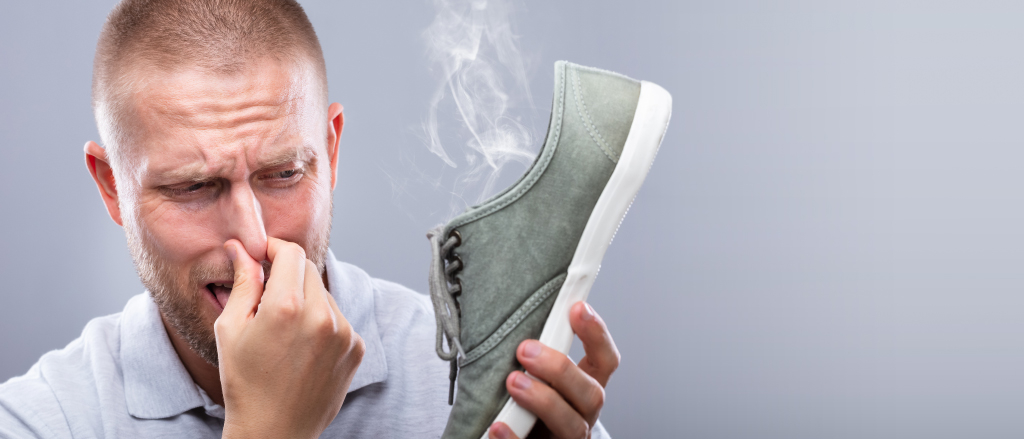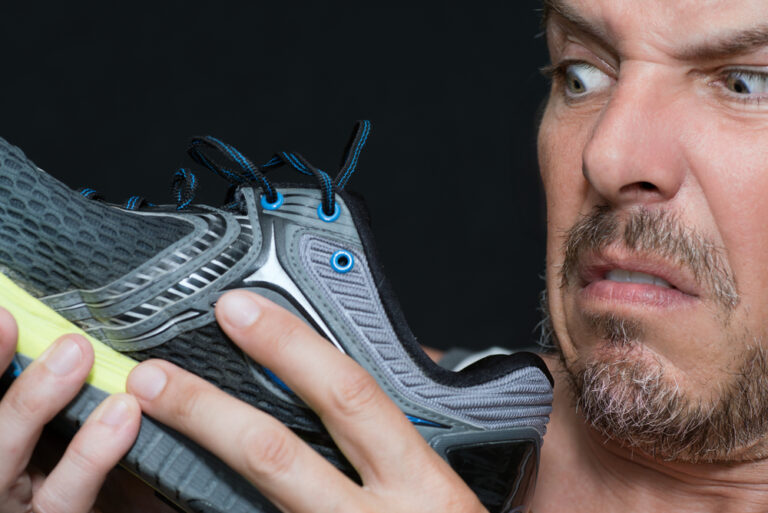The gasoline-like smell in new shoes often comes from the materials used in manufacturing. Certain rubbers, glues, and synthetic compounds emit distinct odors during production.
Additionally, packaging materials, like plastic wraps and cardboard, can absorb and retain these smells. The odor is generally harmless, stemming from the release of volatile organic compounds (VOCs) commonly found in shoe components.
To diminish the smell, consider airing out your shoes, using natural deodorizers, or cleaning them with mild solutions. It’s a common issue, and with time and proper care, the unpleasant scent tends to fade away, leaving you with fresh-smelling shoes.
What materials in new shoes contribute to the gasoline-like smell?

The gasoline-like smell in new shoes can be attributed to the materials used in their manufacturing. Several materials may contribute to this distinct odor
Rubber
Many modern shoe soles are made from synthetic rubber, which is derived from petrochemicals.
The manufacturing process of synthetic rubber can introduce certain chemical compounds that contribute to the characteristic smell. The odor is typically more noticeable when shoes are brand new.
Leather
Genuine leather, while esteemed for its durability and appearance, has a natural scent that can vary based on the type of leather used.
This inherent smell, combined with other materials during the manufacturing process, can contribute to the overall odor of new shoes.
Synthetic Materials
Various synthetic materials, such as certain types of plastics and polymers, are commonly used in shoe manufacturing.
These materials can release volatile organic compounds (VOCs) as they off-gas, leading to the gasoline-like smell. The odor may result from the breakdown of these compounds over time.
Adhesives and Glues
The use of adhesives and glues in shoe construction is essential for bonding different materials together.
These substances often contain solvents and chemicals that evaporate during the manufacturing process, contributing to the overall odor.
Dyes and Finishes
Dyes and finishes applied to shoes for color and appearance can introduce additional scents. These substances may contain chemicals that contribute to the overall odor profile of new shoes.
How do packaging materials affect the odor of new shoes?
Packaging materials play a significant role in influencing the odor of new shoes. The impact can be attributed to various factors related to the composition and interaction of these materials.
Plastic Wraps
Plastic wraps used to protect shoes during shipping and display have the capacity to absorb and retain odors. If the shoes have undergone manufacturing processes that release volatile compounds, the plastic can trap these compounds, leading to an intensified odor.
When shoes are tightly wrapped in plastic, it creates a semi-enclosed space. This environment allows the concentration of odors emitted by the shoes and the materials used in their production.
Cardboard
Cardboard shoeboxes, while durable and common in packaging, can absorb odors. If stored in environments with various scents, the cardboard may retain these smells and transfer them to the shoes.
In some cases, cardboard may not provide sufficient ventilation. This can contribute to the concentration of odors within the shoebox, affecting the overall scent of the shoes.
Materials Used in Packaging
The materials used in the packaging itself, such as adhesives or recycled paper, may have inherent smells. These smells can combine with any residual odors from the manufacturing process, creating a unique and sometimes noticeable scent.
Some packaging materials may release volatile organic compounds (VOCs) over time, especially when exposed to warmth or sunlight. This off-gassing can contribute to the overall odor of the packaged shoes.
Environmental Factors during Shipping
Fluctuations in temperature and humidity during shipping can influence the rate at which materials release odors. Extreme conditions may accelerate the off-gassing of compounds, affecting the scent of the shoes upon unboxing.
Storage Conditions in Retail Settings
Shoes displayed in retail settings may be in close proximity to other products with distinct smells. This proximity can lead to cross-contamination of odors, altering the initial scent of the shoes.
Shoes on display are exposed to open air, allowing the scent to disperse and potentially diminish. However, this exposure can also result in the shoes absorbing additional environmental odors.
What are practical methods for eliminating the smell in new shoes?
Airing Out the Shoes
Importance of Ventilation
Airing out your shoes is crucial for allowing trapped odors to disperse. Remove the insoles and loosen any closures to promote better airflow. Consider placing the shoes near an open window or using shoe racks with good ventilation to speed up the process.
Sunlight Exposure
In addition to ventilation, exposing the shoes to sunlight helps eliminate moisture and bacteria, reducing the potential for odors. UV rays have a natural deodorizing effect.
Using Natural Deodorizers or Absorbers
Baking Soda Applications
Baking soda is a versatile and effective natural deodorizer. Sprinkle baking soda inside the shoes and let it sit overnight. Vacuum or shake out the excess powder the next day. This helps neutralize odors and absorbs moisture.
Activated Charcoal Benefits
Activated charcoal, available in sachets or bags, absorbs and traps odors. Place these charcoal absorbers inside your shoes to capture unwanted smells. Remember to replace or reactivate the charcoal periodically for optimal results.
Specific Cleaning Methods for Certain Materials
Leather Shoes
For leather shoes, use a damp cloth with mild soap to clean the exterior. Avoid submerging them in water. To address interior odors, stuff the shoes with newspaper to absorb moisture, and sprinkle baking soda inside.
Mesh or Fabric Shoes
Cleaning mesh or fabric shoes may involve a gentle hand wash using mild detergent. Ensure proper drying to prevent mildew and odors. Inserting newspaper or using moisture-absorbing insoles can aid in drying and reducing smells.
Insoles and Inserts
Removable insoles and inserts can be washed separately according to the manufacturer’s guidelines. Consider using anti-bacterial soaps or solutions to target odor-causing bacteria. Ensure thorough drying before reinserting them into the shoes.
Is the gasoline-like smell in new shoes harmful, and are there any health concerns?

The gasoline-like smell in new shoes is generally not harmful, and there are usually no significant health concerns associated with it.
The odor is primarily a result of the materials and processes used in the manufacturing and packaging of the shoes. However, it’s essential to consider a few points:
Commonality and Temporariness
The gasoline-like smell is a common occurrence in new shoes, and it tends to be temporary. As the shoes air out and are exposed to the environment, the intensity of the odor typically diminishes over time.
Volatile Organic Compounds (VOCs)
The smell may be attributed to the release of volatile organic compounds (VOCs) from materials such as adhesives, glues, and synthetic components used in the manufacturing process.
While VOCs can contribute to odors, they are generally present in low concentrations and are not considered harmful in the context of new shoes.
Individual Sensitivities
Individuals with heightened sensitivities or allergies may experience discomfort in response to certain smells.
However, this is more of a personal response rather than a direct health concern related to the shoes themselves.
Ventilation and Airing Out
Airing out the shoes in a well-ventilated area helps to disperse any lingering odors and ensures that any potential traces of VOCs are minimized. This practice is especially useful in addressing concerns related to odor and providing a fresher overall experience.
Preventive Measures
If there are specific health concerns or sensitivities, individuals can take preventive measures such as choosing shoes made from natural materials or opting for brands that prioritize eco-friendly and low-emission manufacturing processes.
FAQ
Should I clean my shoes with gasoline?
No, using gasoline to clean shoes is not recommended. Gasoline is flammable and poses safety risks. Instead, opt for mild soap, water, or specialized shoe-cleaning products.
Do cheap shoes usually smell bad?
The odor in shoes is not solely determined by the price. Cheap shoes may use lower-quality materials, but proper care and hygiene practices can help prevent and manage odors in any footwear.
Does baby powder remove odor from shoes?
Yes, baby powder can help absorb moisture and neutralize odors in shoes. Sprinkle it inside the shoes, let it sit, and shake out the excess to freshen them up.
What is the most powerful odor eliminator?
Activated charcoal is considered one of the most powerful odor eliminators. It absorbs and neutralizes a variety of odors effectively. Place charcoal sachets or bags inside shoes for optimal results.
How do you get rid of stinky feet permanently?
To address stinky feet, practice good foot hygiene, wear moisture-wicking socks, choose breathable shoes, and use foot powder. Rotate your shoes, wash them regularly, and consider using antifungal treatments to prevent bacterial growth.
Why do smelly feet turn me on?
Attraction to specific scents, including foot odor, is subjective and varies among individuals. It may be linked to personal preferences, psychological factors, or pheromones.
Final words
The gasoline-like smell in new shoes is a common occurrence due to materials and processes during manufacturing. While the odor might be strong at first, it’s generally harmless. Airing out your shoes, using natural deodorizers like baking soda, and practicing good shoe care can help minimize the smell over time.
Remember, this scent is temporary, and as you wear your shoes and let them breathe, it will gradually fade away. So, put on your favorite pair, enjoy the comfort, and know that the peculiar smell is just a part of breaking in your new footwear.

